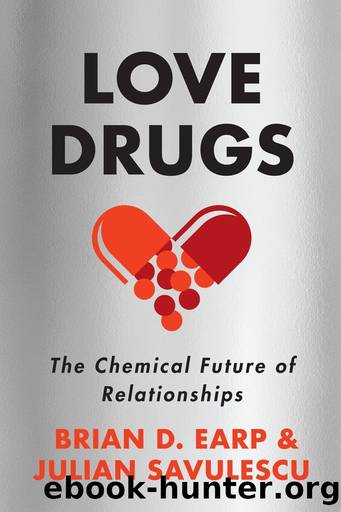Love Drugs by Brian D. Earp & Julian Savulescu

Author:Brian D. Earp & Julian Savulescu [Earp, Brian D. & Savulescu, Julian]
Language: eng
Format: epub
Publisher: Stanford University Press
Published: 2020-01-20T16:00:00+00:00
CHAPTER 11
AVOIDING DISASTER
SO FAR WE HAVE TRIED TO SHOW that love drugs and anti-love drugs are not some made-up possibility for the future: biotechnologies are currently available that can have an enhancing or degrading effect on the neurochemical bonds that underlie romantic love, and these could plausibly be used to help maintain some good relationships and end some bad ones. Drugs and other technologies with even more powerful effects on relationships will likely continue to be developed, and we have suggested that the time is now to set up an ethical framework for handling this situation.
By looking at specific cases and thinking through likely benefits, risks, and contextual factors, we argued that some potential uses of love drugs or anti-love drugs would be ethically appropriate. But we have mostly left untouched the bigger-picture questions about implications for society if people started using biotechnology in those ways.
What this means is that even if you happen to agree with our take on the specific cases, you might still think that society as a whole would be better off without any type of love drugs in the first place, since their very existence might cause more problems than they help to solve. Now, as we argued, itâs really too late for this kind of response, since love-altering drugs are already available and some are in widespread use. The question then becomes one of regulationâwho should get to use the drugs that do exist? Under what conditions should they be made available? How should we respond to the development of new relationship-affecting biotechnologies? Should we try to prevent their coming into existence or restrict their use? And so on.
In answering these questions, letâs remember that any new technology poses risks. This is true whether itâs a relationship drug, the internet, or mobile phones. The mere possibility that a technology could have a downside is never a sufficient reason to reject it, however alarming the potential downside might be. Instead, the harms that might come with the (mis)use of the technology have to be weighed against the benefits that could come with its responsible use, considered in light of plausibly achievable laws, policies, and practices that could alter the balance for the better.
In the case of love drugs, we have argued that some couples may find them helpful in restoring their relationship, if that is what they judge to be best, especially if there are vulnerable children involved who would otherwise be harmed by their separation. In the case of anti-love drugs, we have argued that the ability to sever emotional ties with an abusive partner could benefit some people, so long as social and legal routes were not neglected. Other benefits could include the voluntary reduction of pedophilic desires, unwanted adulterous impulses, or overpowering feelings of unrequited love.
Still there are serious risks to consider on a larger scale. One potential issue is that by bringing love and relationships into the domain of medicine, no matter how successful we might be in alleviating suffering or promoting interpersonal well-being, we would lose something of great value in our intimate lives.
Download
This site does not store any files on its server. We only index and link to content provided by other sites. Please contact the content providers to delete copyright contents if any and email us, we'll remove relevant links or contents immediately.
| Administration & Medicine Economics | Allied Health Professions |
| Basic Sciences | Dentistry |
| History | Medical Informatics |
| Medicine | Nursing |
| Pharmacology | Psychology |
| Research | Veterinary Medicine |
When Breath Becomes Air by Paul Kalanithi(7264)
Why We Sleep: Unlocking the Power of Sleep and Dreams by Matthew Walker(5642)
Paper Towns by Green John(4169)
The Immortal Life of Henrietta Lacks by Rebecca Skloot(3826)
The Sports Rules Book by Human Kinetics(3588)
Dynamic Alignment Through Imagery by Eric Franklin(3489)
ACSM's Complete Guide to Fitness & Health by ACSM(3469)
Kaplan MCAT Organic Chemistry Review: Created for MCAT 2015 (Kaplan Test Prep) by Kaplan(3423)
Introduction to Kinesiology by Shirl J. Hoffman(3301)
Livewired by David Eagleman(3122)
The River of Consciousness by Oliver Sacks(2992)
Alchemy and Alchemists by C. J. S. Thompson(2911)
The Death of the Heart by Elizabeth Bowen(2901)
Descartes' Error by Antonio Damasio(2731)
Bad Pharma by Ben Goldacre(2730)
Kaplan MCAT Behavioral Sciences Review: Created for MCAT 2015 (Kaplan Test Prep) by Kaplan(2492)
The Gene: An Intimate History by Siddhartha Mukherjee(2491)
The Fate of Rome: Climate, Disease, and the End of an Empire (The Princeton History of the Ancient World) by Kyle Harper(2436)
The Emperor of All Maladies: A Biography of Cancer by Siddhartha Mukherjee(2431)
